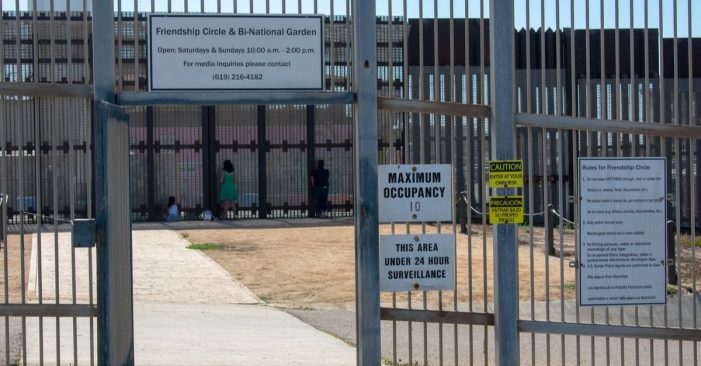Separated immigrant family members reunite through bars and mesh of United States – Mexico international border at Friendship Park – Binational garden – San Diego, California, USA – November 3, 2018 (Shutterstock)
By Krish Vignarajah, Baltimore Sun
Two years ago, our country watched in horror as our own government literally ripped children from their parents’ arms and locked them away behind chain-link cages. The images and recordings of children crying in the media were so disturbing, so alien to who we thought we were as a free, civilized country, that politicians on both sides of the aisle called for its immediate end. The outcry was swift; the policy was ended.
But for the 545 children who still haven’t been reunited with their parents, it was only the beginning of a three-year nightmare with no end in sight.
Though it made national headlines in the summer of 2018, “zero tolerance,” or family separation, actually began with a 2017 pilot project along the Texas border, during which at least 1,000 families were separated. The pilot was ultimately expanded across the entire border and led to the separation of more than 5,400 migrant children from their parents — 300 of which were under the age of 5.
The organization I lead, Lutheran Immigration and Refugee Service, was one of only two national nonprofits the government called upon to reunite separated families. Our specialists in the field have seen many difficult cases, but even they were shocked to see children and toddlers, separated from their parents and visibly shaken from the trauma of losing their only pillar of stability after a long, dangerous journey to the U.S. Our staff never imagined we would be charged with providing care for breastfeeding infants torn from new mothers’ arms.
I have a 3-year-old daughter. I can’t imagine being separated from her for longer than a night at her grandparents’ house, let alone for weeks and months. The thought that she could have been torn from my arms when she was an infant and I would not, to this day, have seen her again is unfathomable. So much happens in those first three years of life: first steps, first words, first hugs. Ninety percent of a child’s brain develops before age five. The loss of those formative years is unrecoverable, and unconscionable.
To make matters worse, we have recently learned that top administration officials were aware and deliberate in their support of the separations. According to New York Times reporting on a Justice Department investigation, top officials in the department like former Attorney General Jeff Sessions rebuked prosecutors in border states who had objections to separating children of a tender age from their parents.
Administration leadership was also unanimous in its support for the practice. According to the same reporting, 11 out of 12 senior Trump officials raised their hand in support of family separation in a May 2018 meeting — the only dissenter, former Secretary of the Department of Homeland Security Kirstjen Neilsen, caved to pressure and signed the order the next day.
Revelations of political palace intrigue are of little consolation to these hundreds of children who have been robbed of the basic human right to grow up with their parents. They will go to bed tonight, as they have for nearly 1,000 nights, not knowing where their parents are.
How could this happen? According to court filings from the American Civil Liberties Union and other immigrant groups, many of the parents had already been deported to their home countries before a federal judge ordered the reunification of families. Egregiously insufficient record-keeping left hundreds of children behind; in its deliberate haste to implement what ultimately amounts to a failed deterrence strategy, the administration put no thought into creating a meaningful system to reunite families after they had been separated.
Court-appointed researchers on the ground working to locate parents have been stifled by the lack of actionable government data, turning instead to airing radio spots throughout Mexico and searching through rural communities in Central America.
While they continue to look for parents, we as citizens must look at ourselves in the mirror. Because we have no other choice but to demand our government reunite these families once and for all, and grant them legal status so that they might find peace and protection. Beyond that immediate priority, we must hold accountable each and every official who forsook basic decency, core American values, and humanitarian law to allow our government to traffic in kidnapping. In the Land of the Free, families belong together.




